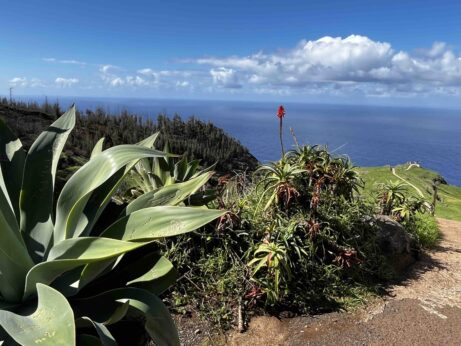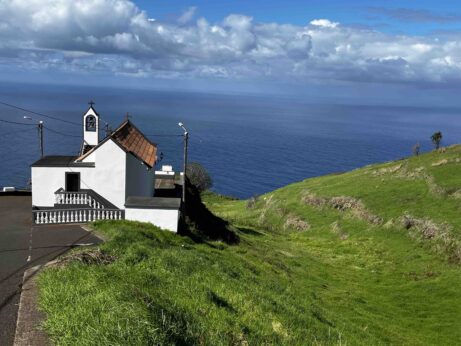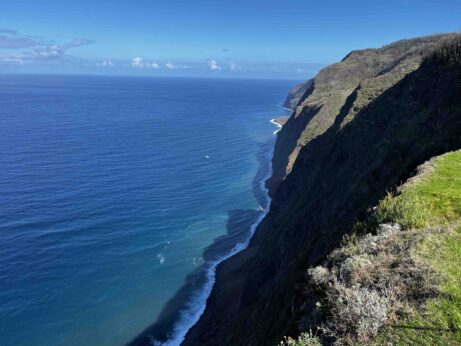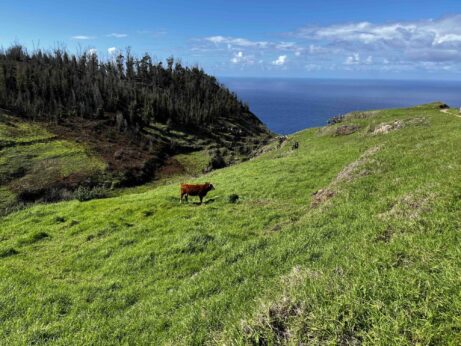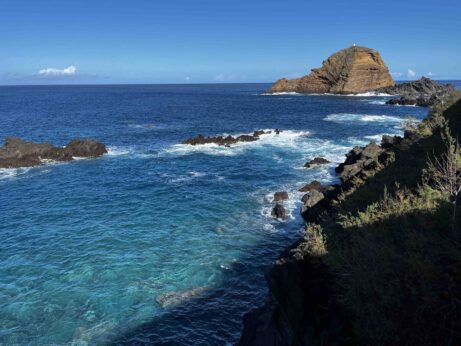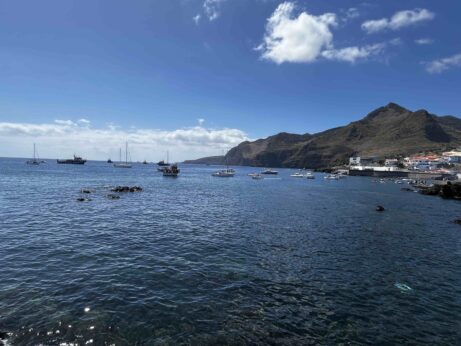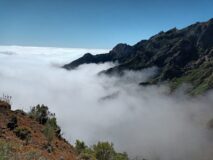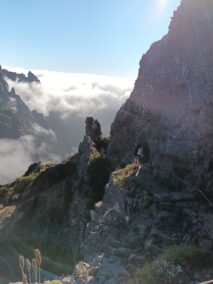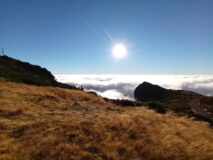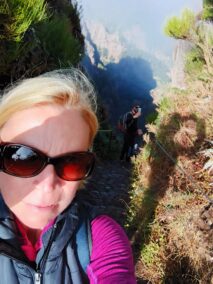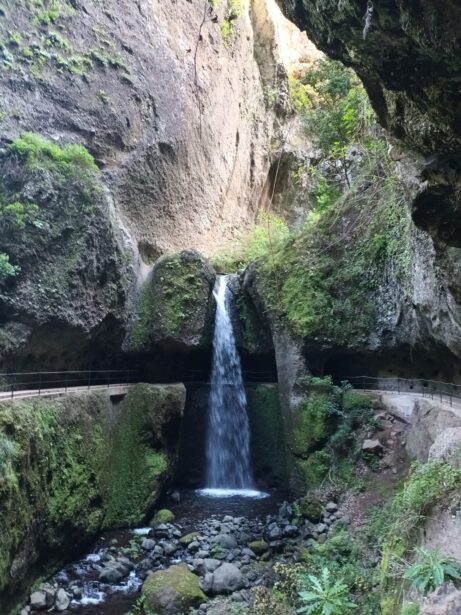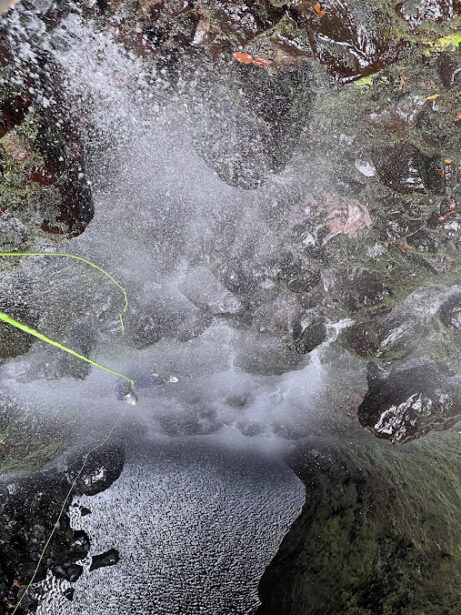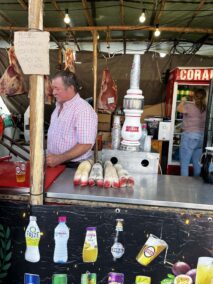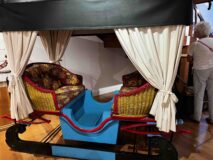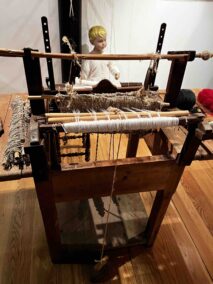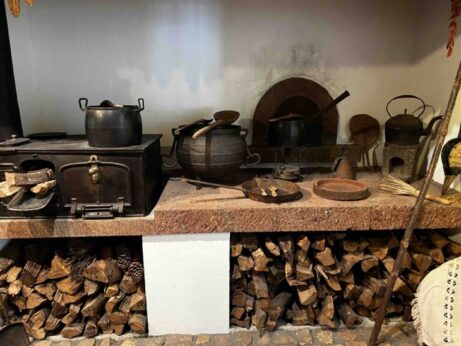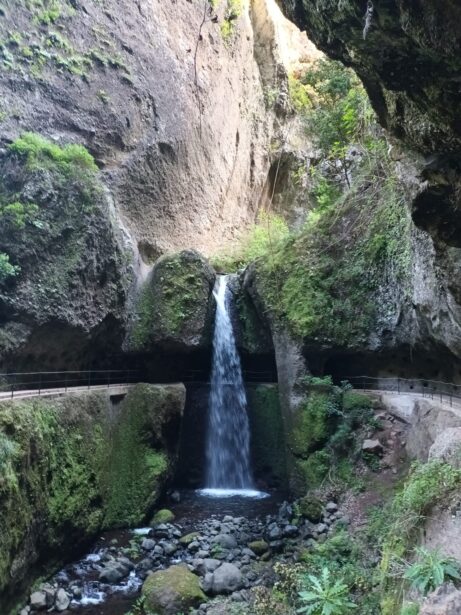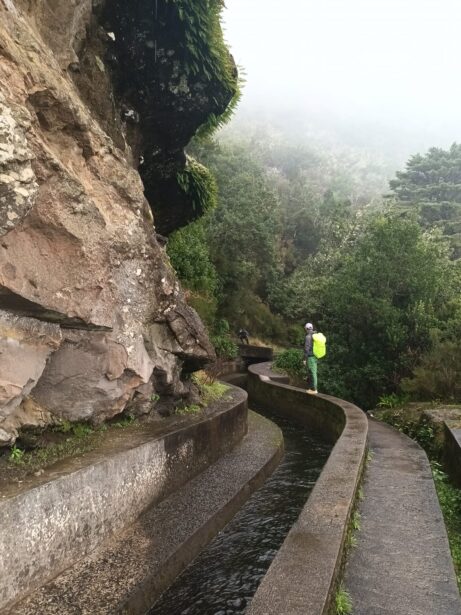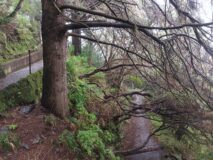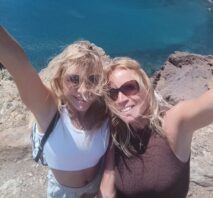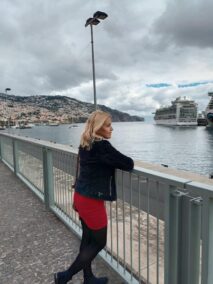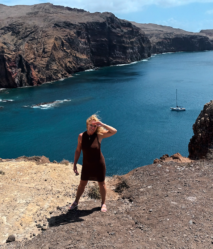MADEIRA only for the hardened: Step beyond comfort
MADEIRA – an island full of challenges and contrasts
Madeira, known as the “Pearl of the Atlantic”, is the ideal destination for all adventurers who want to discover untamed nature and overcome their limits. This Portuguese island offers breathtaking scenery from dramatic cliffs to magical places such as the Laurissilva forest, protected by UNESCO, thundering waterfalls to the majestic mountains of Pico do Arieiro and Pico Ruivo.
For adrenaline lovers, there are narrow levadas, where you can try trekking at heights above deep gorges with many waterfalls along the way, or wild coastal cliffs ideal for canyoning or paragliding. The blue ocean around the magical island invites you to surf, dive or fish. And those who like challenges can explore the unique fauna and flora in the remote corners of the island.
Madeira is a place that challenges you to step outside your comfort zone and rewards you with experiences you'll never forget.
Climate and rugged nature: Beauty that will take your breath away
Unique climate: Madeira offers fascinating contrasts – from the humid subtropical Laurissilva forests, where ferns and moss thrive, to the dry, sun- and wind-scorched slopes of the island’s eastern Atlantic coast. Thanks to the high mountains, the natural water cycle and the globally unique levada system, the island is a year-round green paradise with diverse microclimates.
Challenging hiking conditions: The steep slopes, steep trails and sudden changes in weather in Madeira will test every hiker. Add strong winds on the mountain ridges and unpredictable rain showers, sliding down rocky slopes – and you have the ideal destination for lovers of great challenges. Some hikers very often underestimate the specific local conditions. Especially after heavy rains, when there is a real risk of landslides and rockslides.
This is our third year here and we have already experienced several fatal cases. It was always about the lack of attention from tourists, overestimation of one’s own strength, inappropriate footwear, the desire for a “unique” selfie…
Life and business under the Madeiran sun: Challenges at every turn
Madeira is a paradise for nature lovers, but life here is not just a postcard idyll. If you want to live or direct your business to outdoor activities, be prepared for some challenges:
Changeable weather – In one day you will experience hot sun, fog, wind and rain. This is doubly true for an outdoor business.
Rough terrain – The beauty of the mountains and cliffs goes hand in hand with the difficult accessibility of some places. Logistics can be challenging. And what if something happens.
Local mentality – Madeirans have their own rhythm. Patience is key when building relationships and cooperation. And sometimes it’s “Mug Enough” when it comes to patience.
Tip: Be prepared for the unexpected and be flexible. Madeira will teach you to improvise and live in the moment like nowhere else in the world.
Do you have a similar experience in Madeira? Share it in the comments below the article!
Local mentality: Slow time and warm smiles
How do Madeirans perceive life? Friendliness, peace, but also a unique way of solving things
Madeira people are known for their hospitality and friendly attitude. You will encounter a smile on the street, a kind word in the shop and a willingness to help when you are in trouble. Their mentality comes from generations of life on the island, where everyone was dependent on their neighbors and community. This spirit of solidarity persists today and foreigners often praise the warmth of the locals.
On the other hand, Madeirans live at their own pace. Time passes more slowly here and things are solved more "mañana style". This means that administration, repairs or agreements may take longer than you are used to from your home country and than you would expect. However, this unhurriedness is not a sign of laxity - rather it reflects a different way of approaching life, which is less stressful and requires patience.
The way they solve problems is also specific. The locals prefer improvisation to precise planning. This can sometimes be frustrating, other times a pleasant surprise when things are solved unexpectedly simply. And they don't even want to pay for it! If you can tune into this wave, your life in Madeira will gain a new dimension - less control, more joy from life itself, more of your own FREEDOM. The Madeiran way of life helps you a lot in this, don't resist it, open up to it.
Specific features: respect for traditions, resistance to adverse weather conditions
Traditions are deeply respected in Madeira. Whether it is annual festivals, folk songs or wine production, the islanders proudly preserve their cultural heritage. For foreigners, this can be a fascinating opportunity to immerse themselves in local customs. If you show an interest in these traditions, the Madeirans will be happy to include you in their community and share their stories.
For example, I managed to taste a 35-year-old, very “aged” Madeiran rum (during a visit to the family’s former small factory for producing Madeira wine and rum of my colleague from QUALI). A very delicious drink!
However, life on the island is not only about celebrations and traditions. Madeira faces changeable weather, storms and strong winds, which can affect daily life and business. The locals are used to these challenges and have learned to live with them. Their resilience and adaptability are admirable – as is their skill in making repairs that would otherwise require professional intervention.
If you want to succeed in Madeira, drawing inspiration from these qualities is essential. Respecting the local way of life and accepting the inevitable fluctuations will help you better understand the islanders’ mentality.
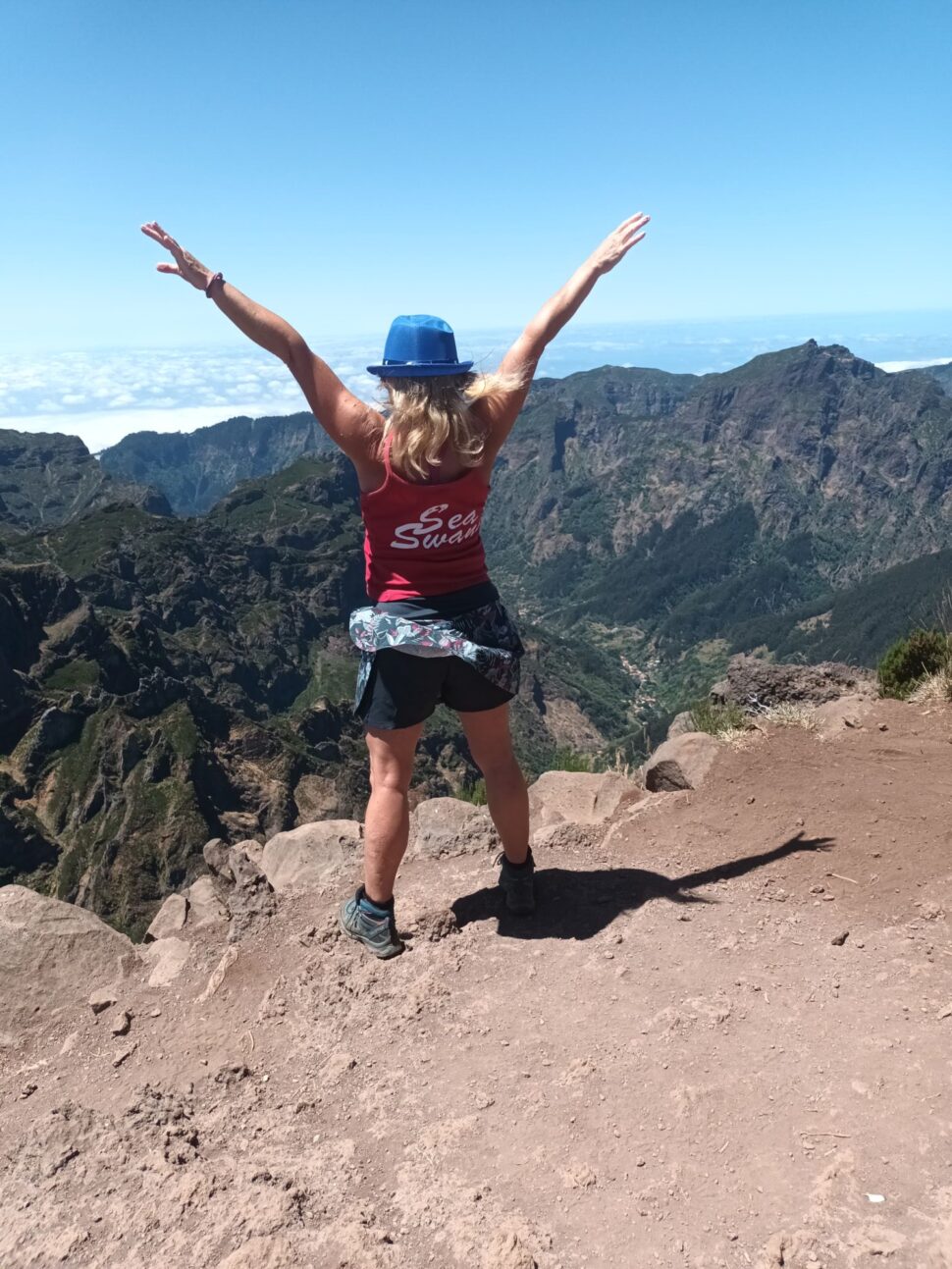
How to adapt to this pace of life as a foreigner
Adjusting to the pace of life of Madeirans can be a challenge, especially if you are used to a fast and structured way of life. PATIENTE IS THE KEY – be prepared that not everything will be solved immediately and that some things will take their own time. Learning to “let things go” is the key to enjoying life on the island.
It is also important to establish relationships with the locals. A friendly gesture or an interest in their culture will open many doors for you. At the same time, try to adapt to their way of communication – be polite but informal, and be prepared for longer conversations even where you might not expect them. For example, with your grandmother on the way to get pastries, she will tell you everything that happened and who and where she lives and whose relative she is and where she studies and works and where she has been …. 15 minutes will fly by before you know it and the whole time he is curiously looking at you and smiling at you.
Understanding local priorities is also essential. Work and bureaucracy sometimes give way to family, celebrations or just the need to relax. Respecting these values is the way to make Madeirans accept you as one of their own.
Eventually, you will create your own rhythm. Ideally, combine your culture with the island's and find a balance between productivity and relaxation. Madeira will teach you that life is more about the quality of moments than about constantly chasing goals. And if you find the aforementioned balance, you will really enjoy life on the island.
Living on the island: Tradition, agriculture and new trends
Traditional livelihoods: agriculture, fishing, tourism
Historically, Madeira was dependent on agriculture and fishing. The island's conditions are ideal for growing grapes, bananas and sugar cane, which form a significant part of the local economy. On terraced fields, known as poios, generations of locals learned to make the most of narrow strips of land. To this day, agriculture is still an important source of livelihood, although modern technology is gradually replacing traditional methods of work.
Fishing is another pillar of Madeira’s economy. The island’s fishermen are famous for catching swordfish and tuna, which they export all over the world. Local fish markets, such as those in the town of Câmara de Lobos, still attract tourists with their authenticity. For Madeirans, fishing is not only a source of livelihood, but also a cultural legacy that remains an inseparable part of their identity.
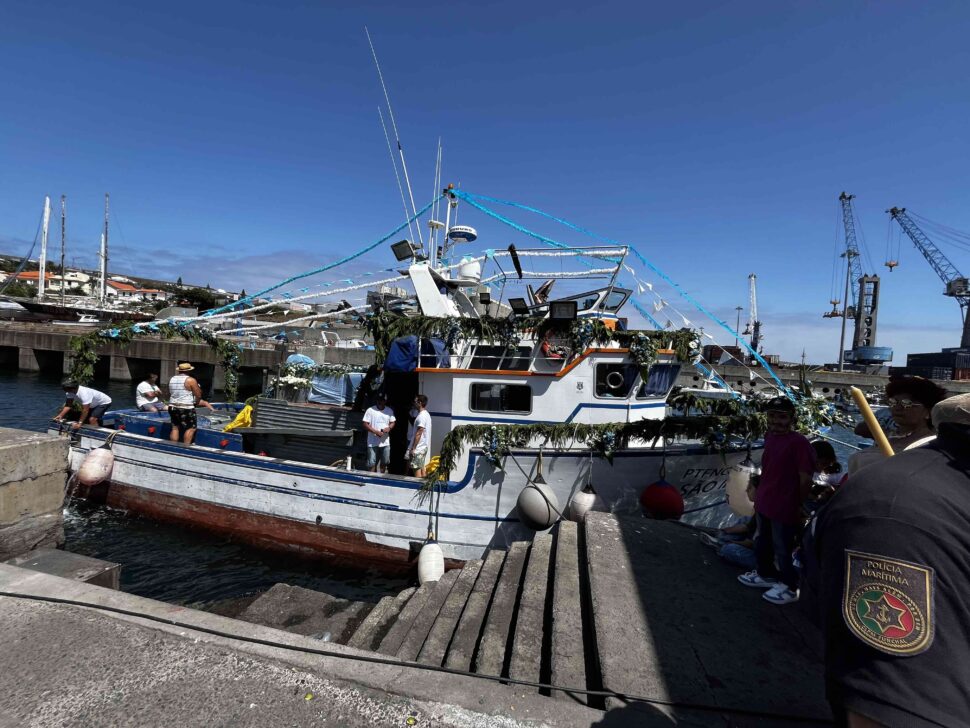
Tourism is the most important current economy of Madeira. The island attracts visitors with its beautiful nature, levada trails and unique festivals such as the February CARNIVAL or the FLOWER FESTIVAL. Local residents are increasingly focused on providing accommodation, experiential activities and guide services. Connecting traditions with the tourism industry is a natural evolution that helps preserve culture and at the same time brings new opportunities. The blow for them was, of course, COVID.
Modern changes: remote work and a new expat lifestyle
In recent years, Madeira has seen an influx of expats and digital nomads looking for an inspiring environment for remote work. Thanks to initiatives such as the Digital Nomads Madeira project, the island has become a sought-after destination for people working online. Or the START UP Madeira project, which gives opportunities to new projects, investors. They bring not only money and job opportunities on the island, but also new ideas and contacts that help modernize the island.
However, the new lifestyle also brings challenges. Locals can find it difficult to adapt to the rapid influx of foreigners, especially in smaller communities. The growing demand for rentals is also driving up property prices, creating tensions between old-timers and newcomers. However, Madeirans generally welcome the changes and see them as an opportunity for development.
For expats, Madeira offers a great work-life balance. Many have embraced the flexible working hours that they combine with hiking, swimming or experiencing the local culture. This lifestyle proves that Madeira can combine traditional values with a modern way of life. And we really enjoy it.
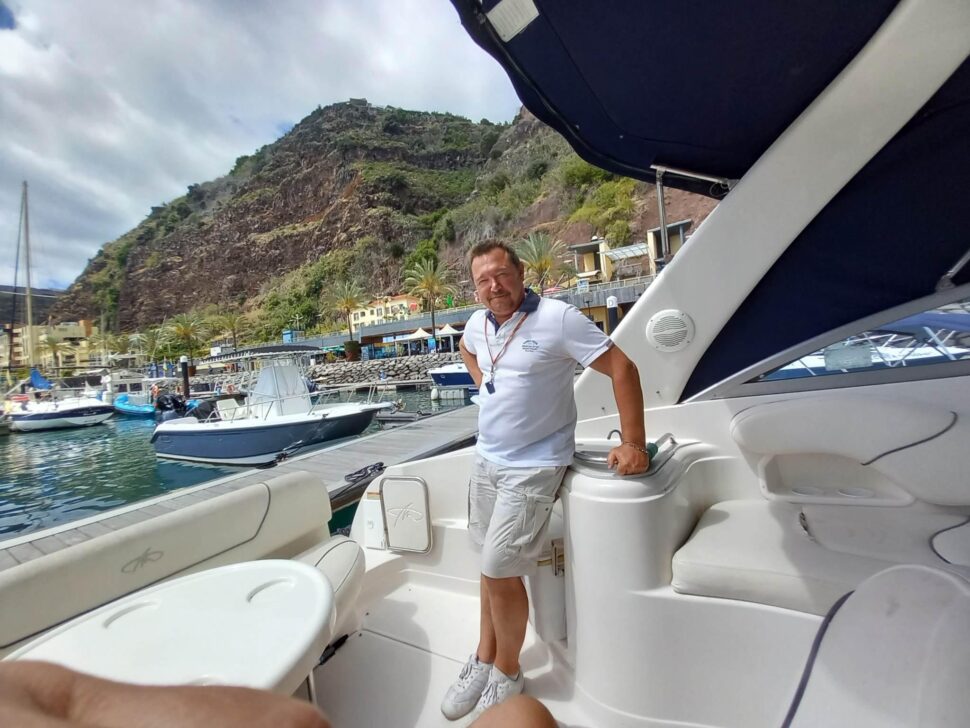
Challenges in finding a job or starting your own business
Finding a job in Madeira can be challenging, especially if you don’t speak Portuguese fluently. Most job opportunities are in tourism, gastronomy or construction, which may not meet the expectations of all foreigners. In addition, salaries are significantly lower than in most European countries, which can be limiting for those who want to live on the island long-term.
Starting your own business is another challenge. The administration in Madeira is quite complicated, and if you don’t have local contacts or experience, it can be difficult to obtain permits or complete formalities. The key is to establish good relationships with locals who can help you navigate the system and help you at least initially with the legislation before you start looking around.
On the other hand, Madeira offers unique opportunities for those who want to combine nature with business. From experiential activities to ecological projects. Thanks to my work in real estate, I hear about very interesting projects that are coming up in Madeira and it is only a matter of time before we find a suitable property for them.
Creative entrepreneurs can find the ideal environment on the island to realize their visions. If you are willing to invest time in adaptation and building trust, Madeira can open up a path to success that you would have difficulty pursuing elsewhere.
Pitfalls for expats: What price will you pay for EXOTIC LIFE?
Culture shock and lifestyle adjustment
Moving to Madeira is often associated with culture shock, which comes at the first contact with the local mentality. Madeirans are known for their friendliness, but at the same time they tolerate the peace and slow pace of life. This can be challenging for those who are used to the fast pace of life in big cities. Time flows differently in Madeira and it can take some time to get used to the fact that “tomorrow” or “later” may not mean the same thing as in your home country.
Another aspect that can be shocking is the emphasis on tradition and family ties. Families in Madeira are often very close-knit and celebrations such as weddings, christenings and Christmas celebrations play a key role in their lives. It can be difficult for expats to penetrate these circles, as Madeirans are very protective of their community. However, openness and interest in the local culture can gradually break the ice.
Last but not least, you need to adapt to a different way of communicating. Although the younger generation often speaks English, the older residents rely exclusively on Portuguese. Gestures and smiles play an important role here and can be key to establishing relationships, even if you don’t know the language perfectly. Arrogant people here will encounter the closeness of the people, the “whole island” will quickly find out about a person and will return their inappropriate behavior to them in the form of higher prices, longer deadlines, etc.
Practical obstacles – more expensive imported goods, limited infrastructure in more remote areas
One of the biggest challenges of life in Madeira is the price of imported goods. The island relies on the import of many basic products, which is reflected in their price. Cars, electronics and cosmetics are often more expensive here than on the mainland. On the other hand, local markets offer fresh fruit, vegetables and fish at affordable prices, which can offset the higher costs of other goods. And you will definitely save a lot on energy For light, because it is visible for longer, and for heating, because you do not need heating here.
Limited infrastructure in more remote areas is another complication. Although the capital city of Funchal and its surroundings offer modern amenities and good transport connections, rural areas tend to be less accessible. The roads are often narrow and winding, which increases the time required to travel. And if there is an accident in a tunnel on the Highway, the “whole island” comes to a standstill.
In addition, it is necessary to take into account the limited possibilities for healthcare outside the larger cities. Although there are quality healthcare facilities in Madeira, it may be necessary to travel for specialized care or planned procedures. This limitation is especially important to consider for families with children or the elderly.
Tips for dealing with these challenges
The key to successfully overcoming both culture shock and practical obstacles is preparation. It pays to learn at least the basics of Portuguese before you move. Even simple phrases will help you gain the respect of the locals and make everyday communication easier. In addition, find out as much information as possible about local customs and lifestyles so that you are not surprised by differences in mentality or pace of life.
As for practical obstacles, it is a good idea to find out in advance where the shops selling local products are located and adapt your shopping habits accordingly. It is also useful to create a network of contacts – whether among locals or expats – who can recommend reliable sources of goods or services. It is also useful to look for online groups focused on living in Madeira, where you can get advice and tips from people who already live on the island.
If you are planning to live outside the capital, consider getting a car, which will make it easier to get around the island and reduce the time needed to travel. Careful planning and an openness to new challenges will help you make your life in Madeira very pleasant and happy. If you are considering relocating, that is, residing on the island, you can bring one car (but be patient with the authorities).
Language barrier: Portuguese as the KEY TO INTEGRATION
How important is knowing Portuguese in Madeira?
Knowing Portuguese is very useful in Madeira, not only for everyday communication, but also for deeper integration into the local community. Although in larger cities such as Funchal you often meet people who speak English, most of the population, especially in the countryside, rely exclusively on Portuguese. Without at least a basic knowledge of the language, it can be difficult to deal with practical situations such as shopping in smaller shops, dealing with authorities or visiting a local doctor, especially communicating at the reception. Doctors usually speak English.
Language also opens the door to understanding culture and traditions. Portuguese-speaking expats often mention that being able to communicate with the locals has given them a much more intense and authentic experience of the island. Locals also appreciate it when foreigners make the effort to learn their language, which can make it easier to make friends.
In addition, some services and information are only available in Portuguese. This applies to legal documents, local news or public notices, for example. Investing in learning the language is not only worthwhile, but can also make life on the island much easier.
Communication with locals, bureaucracy and everyday services
One of the biggest problems that expats and we face in Madeira is communicating with authorities and bureaucratic institutions. Documents and forms are often only available in Portuguese and officials may not always speak English. I often encounter situations where, even though they speak English, they leave you “drowning” and, as the saying goes: JUMP INTO THE WATER AND SWIM!
This can be particularly frustrating when dealing with administrative matters such as registering your residence, opening a bank account, at the tax office or registering a vehicle.
A similar situation applies to everyday services such as calling tradesmen, ordering services or solving problems with electricity or internet supply. In these situations, a basic knowledge of Portuguese can be invaluable. Those who speak the language often experience faster and more helpful responses. I can only confirm.
Fortunately, Madeirans are usually very helpful and patient. If you make an effort to communicate and a fair amount of patience, even if with mistakes, most locals will accommodate you. Often, a few words and a willingness to use gestures or a translator are enough to achieve understanding.
Recommendations for learning the language and stories from those who have overcome the barrier
Learning Portuguese does not have to be as difficult as it might seem at first glance. An online course or an app such as Duolingo, Babbel or Memrise can help you get started. These platforms offer easy and fun ways to learn the basics of the language. The next step can be to take language courses directly in Madeira, where you learn in context and build relationships with other students. Cities on the island offer FREE courses for foreigners. I myself am grateful to take advantage of these.
Immersing yourself in the language through everyday interactions is also very effective. Visiting local markets, watching Portuguese TV or listening to local radio will help you get used to the rhythm and melody of the language. Expats who have mastered the language this way often mention that the key to success was regularity and, again, patience.
The stories of people who have overcome the language barrier and are now enjoying Madeira to the fullest are inspiring.
For example, one of our British neighbors (74 years old) who has lived on the island for ten years, told how his Portuguese-speaking neighbors helped him repair his house and even invited him to a family party. Another expat from Germany shared how her knowledge of the language opened the door to a job opportunity at a local company. For me, the rewards of learning Portuguese are in the form of new professional connections. These stories prove that investing in learning the language pays off handsomely.
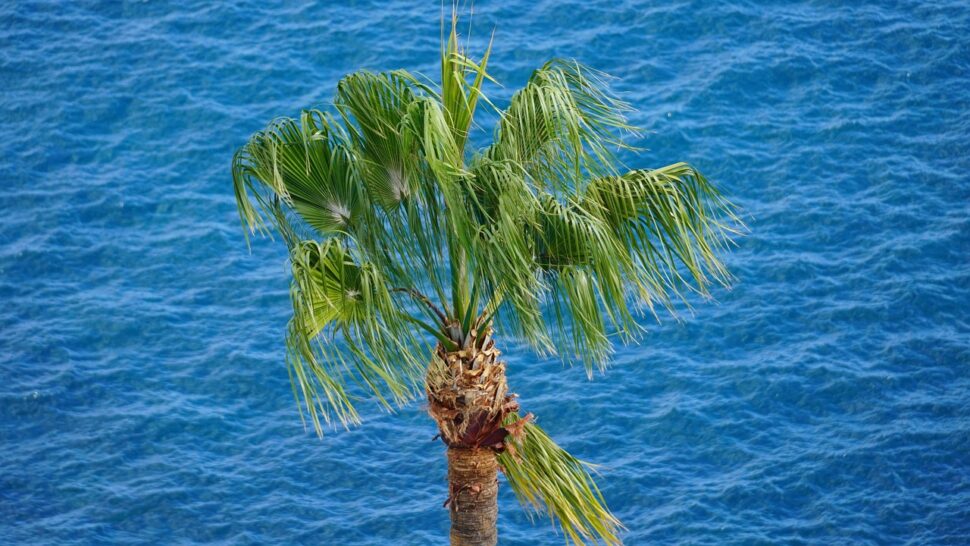
Bureaucracy: Those who persevere will win
Complications in handling documents, permits and contracts
Bureaucracy in Madeira is one of the biggest sources of frustration for many expats. The processes at the authorities are often lengthy and not always clear. Added to this is the language barrier, as many documents and instructions are only available in Portuguese. Obtaining a residence permit, registering a property or opening a bank account can require several visits to different institutions and careful compliance with local rules.
Another common problem is the different interpretation of rules at different authorities. What is required in one place may be rejected or amended in another. Without knowledge of local customs and patience, these situations can become time-consuming and mentally demanding. For example, there are 3 registers for land and sometimes the area of the land differs by up to 30%!
Contracts and legal documents, which are often formulated in complex language, are also not immune to problems. Without the help of an expert, they can be difficult for expats to understand, which increases the risk of overlooking important details. Even a simple mistake can have serious consequences, for example when concluding real estate purchase contracts.
Stories of patience and perseverance
Successfully managing administrative processes in Madeira often requires more than just diligence - it is a test of patience and perseverance. For example, our American neighbors recall how obtaining various residency documentation took them several months and involved countless visits to the authorities and a few trips back to America. Nevertheless, they did not give up and, thanks to the willingness of local good souls, they finally achieved their goal and dream.
When we meet for coffee, balao or poncho, I can tell you many human stories and I love to tell them. And it turns out that patience brings roses
The personal experiences of many people show that the key is not only patience, but also a willingness to accept help. Using contacts, advisors or local friends can make the process much easier and save you a lot of time and stress.
Tips on how to simplify administrative processes – local contacts, legal assistance
One of the best ways to make bureaucratic matters easier: establish contacts with local experts. Local lawyers, notaries or real estate agents often have an overview of the current requirements and can guide you through complex processes or put you in touch with someone else who is competent. Although their services may represent an investment, this will usually pay off in the form of time saved and the elimination of possible mistakes.
It is also worth using contacts in the local community or among expats. Those who have already been through the process can recommend best practices and advise you on how to avoid common mistakes. Online groups or local forums are a great source of this information.
Finally, it is a good idea to prepare for all administrative tasks as best as possible. Always have all the necessary documents, copies and translations with you. Be prepared that some processes may take longer than you expect. And most importantly – do not lose optimism and be open to communication. With patience and the right approach, you will overcome all the pitfalls of Madeiran bureaucracy and achieve your dream.
What to write in conclusion? MADEIRA is both a test of courage and an opportunity for a new beginning
Living in Madeira brings a mix of challenges and rewards like LIFE itself, which can completely change your perspective on everyday life. From the beautiful nature with dramatic cliffs and lush forests, to the colorful markets full of fresh fruit, to the friendliness of the locals – Madeira has a lot to offer. However, you need to be prepared for some practical and cultural obstacles, such as higher prices for imported goods, slower bureaucratic processes or the language barrier.
At the same time, these challenges teach patience, adaptability and the ability to see beauty even in unexpected situations. Living on the island gradually makes you slow down and enjoy life in its simplest form – from a cup of coffee overlooking the ocean to evenings spent under the stars. These moments create memories that far outweigh the everyday difficulties.
A summary of the challenges of living in Madeira is not just a warning – it is also an invitation. If you are willing to embrace differences and adapt to a new environment, Madeira will open up to you in its most beautiful form. The island will teach you to live authentically and with gratitude for the little things that may be overlooked elsewhere.
If you are ready to push your limits, Madeira will reward you
Moving to Madeira is not just a change of address - it is a step outside your comfort zone that will enrich you and your family in many ways. The island will require flexibility, patience and determination from you, but it will also reward you with experiences that you will not experience anywhere else. The daily view of the endless ocean, local festivals full of music and dance, and friendly gestures from the people who will become your neighbors will create a unique framework for a new beginning.
Madeira is not for everyone, but that is precisely its charm. If you are ready to push your limits and adapt to this unique environment, a world full of inspiration and beauty will open up to you. It is a place that teaches you to slow down, appreciate the present moment and find a balance between nature, community and personal values.
Embark on this journey with an open mind and a willingness to learn new things. Madeira will not disappoint you – on the contrary, it can transform you and bring joy to your life like you have never known before. Whether you are looking for a new home, an opportunity for growth or just a life adventure, Madeira is ready to be part of your personal or investment story.
Do you have MADEIRA in your head or in your heart? Are you tempted by investing in real estate? Connect with me!
BOAS FESTAS! FELIZ NATAL!
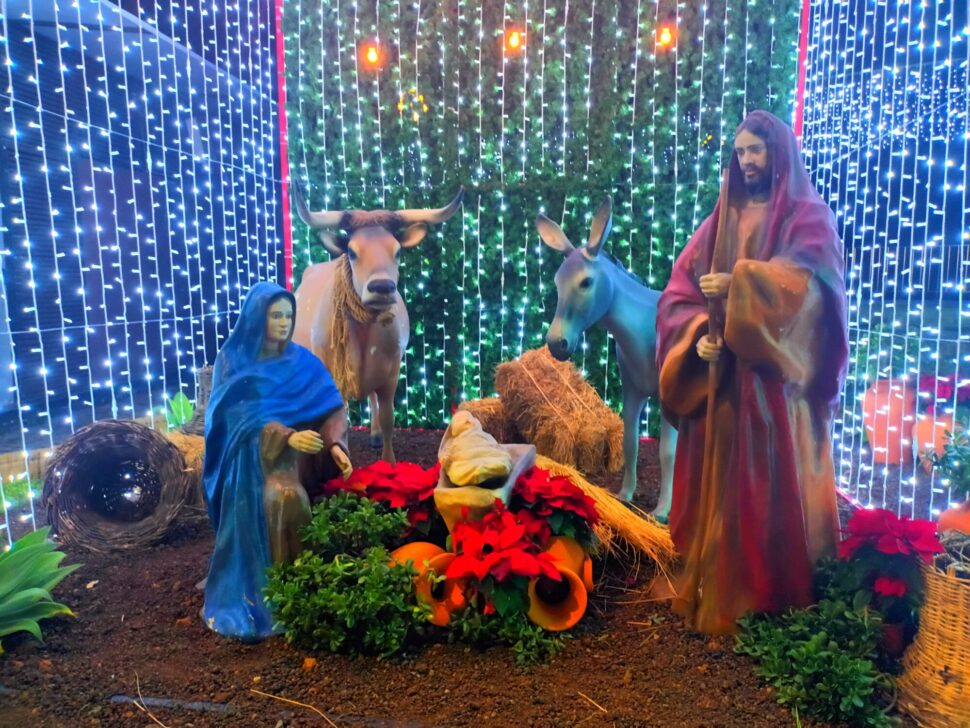
Do you want to know more? Download this eBook for FREE
